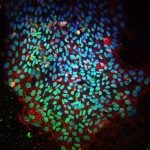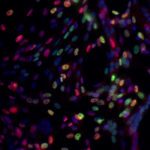Lien vers Pubmed [PMID] – 20947452
Lien DOI – 10.1016/j.dnarep.2010.09.001
DNA Repair (Amst) 2010 Nov; 9(11): 1187-99
The specialised DNA polymerase μ (pol μ) affects a sub-class of immunoglobulin genes rearrangements and haematopoietic development in vivo. These effects appear linked to double-strand breaks (DSBs) repair, but it is still unclear how and to what extent pol μ intervenes in this process. Using high-resolution quantitative imaging of DNA damage in irradiated wild-type and pol μ⁻(/)⁻ mouse embryonic fibroblasts (MEFs) we show that lack of pol μ results in delayed DSB repair kinetics and in persistent DNA damage. DNA damage triggers cellular senescence, and this response is thought to suppress cancer. Independent investigations either report or not a proliferative decline for MEFs lacking pol μ. Here we show pronounced senescence in pol μ⁻(/)⁻ MEFs, associated with high levels of the tumor-suppressor p16(INK4A) and the DNA damage response kinase CHK2. Importantly, cellular senescence is induced by culture stress and exacerbated by low doses of irradiation in pol μ⁻(/)⁻ MEFs. We also found that low doses of irradiation provoke delayed immortalisation in MEFs lacking pol μ. Pol μ⁻(/)⁻ MEFs thus exhibit a robust anti-proliferative defence in response to irreparable DNA damage. These findings indicate that sub-optimal DSB repair, due to the absence of an auxiliary DNA damage repair factor, can impact on cell fitness and thereby on cell fate.



